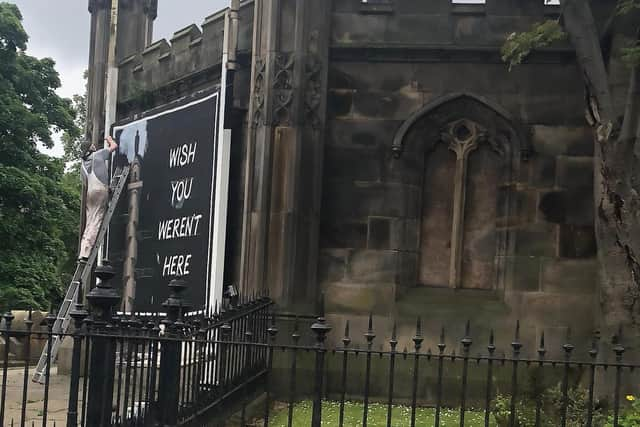Giant poster appears in city centre condemning Melville Monument


The artwork now hangs outside St John’s Church on the corner of Lothian Road and Princes Street.
The poster features a picture of the Melville Monument alongside the caption “Wish You Weren’t Here”.
Advertisement
Hide AdAdvertisement
Hide AdThe space outside the church is often used to display campaigning pieces of artwork.


The Melville Monument, which stands in nearby St Andrew Square, has become a focal point for recent Black Lives Matter protests.
It has been vandalised by anti-racism campaigners in light of the police killing of George Lloyd in Minneapolis.
Some have called for the statue to be removed.
The monument was built to honour Henry Dundas, 1st Viscount Melville, a former advocate and influential politician.
Advertisement
Hide AdAdvertisement
Hide AdAs Home Secretary, he frustrated efforts to end the slave trade after William Wilberforce MP introduced his abolition bill to parliament in 1792.
Campaigners say this aspect of Dundas’ record must be illuminated alongside the imposing memorial in his name.
Dundas proposed support for Wilberforce’s bill but put forward an amendment that the abolition of slave trading would occur ‘gradually’.
Done to appease the powerful pro-slavery lobby, it is estimated that the 15-year delay to abolition created by the amendment led to a further 630,000 Africans being forced into a life of chattel slavery.
Advertisement
Hide AdAdvertisement
Hide AdPrime Minister William Pitt later said that gradual abolition was an “enormous evil”.
Following a long campaign, a plaque is due to be placed at the monument to outline Dundas’ support for gradual abolition.
This weekend, a descendant of Henry Dundas claimed his forefather should actually be praised for his role in ending slavery.
Bobby Dundas, the 10th Viscount Melville, claied that his seven-time great-grandfather played a key role in bringing the slave trade to an end.
Advertisement
Hide AdAdvertisement
Hide AdThe Viscount said: “Henry Dundas was an abolitionist. He was for the abolition of the slave trade. That has been written about by countless people. But you have to understand in the current climate, what was UK politics and the British Empire.
“There was one failed attempt to get it through Parliament and the realistic and pragmatic approach that Dundas took was the only way - which many historians have written about - to make sure that the vision and final goal was achieved.’